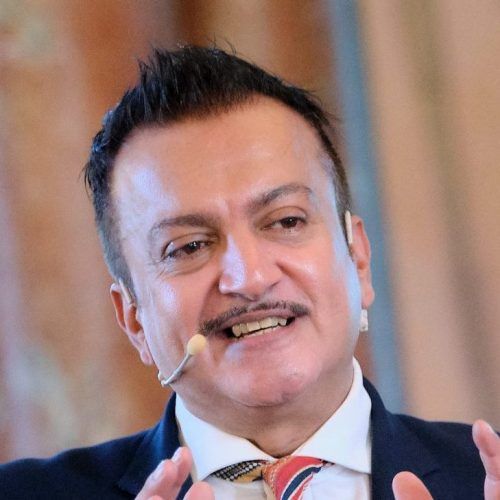Is Europe a feeling, an idea, an experience, a value, a commitment?
Frankly Speaking
Chief Operating Officer and Chief Spokesperson of Friends of Europe
How long have we been brooding endlessly over the meaning of the EU? What meaning does the EU project have for its citizens and how does the EU take this into consideration?
Well, on Wednesday 10 March, European Parliament President Sassoli, Prime Minister of Portugal Costa and Commission President von der Leyen signed the Joint Declaration on the Conference on the Future of Europe (CoFE). It kicks off on 9 May – Europe Day.
While the timing and emotional intelligence of the announcement might have been a bit off, let’s suspend disbelief. Many have been pushing for a big conversation on the future of Europe.
It’s taken an age – well over three years. Though in EU years, this is perhaps a quick turnaround.
Last week’s Eurobarometer survey revealed that the vast majority (92%) across all member states demand that citizens’ voices be ‘taken more into account in decisions relating to the future of Europe’. 51% of respondents thought that people from all walks of life should be actively involved.
The idea of Europe is important
Friends of Europe’s own annual #EuropeMatters survey confirms this data, however, since 2018, it has also consistently revealed that a majority (over 60% of EU citizens) felt that if the EU disappeared, it would not matter to their lives.
Perhaps it’s all in the questions asked, but our conclusion was that it pointed to an inherent paradox: citizens want more involvement, engagement and say in how Europe works, however, in terms of delivery and meaning to them, a significant proportion could take it or leave it.
We can however all agree, as evidenced by the turnout of the European election in 2019 and in this latest poll, that the idea of Europe is important.
But if polls are a reflection of how people feel at a moment in time, as well as a recollection of their experiences, then it is clear that the EU needs to act fast and deliver more.
Our current crises are the best seed bed in which to galvanise a feeling for Europeanness and more importantly, emphasise that the institutional architecture established to secure citizens’ peace, livelihoods and planet matters.
Adjusting old narratives to new environments will not be enough
We are moving into a future that is increasingly unpredictable. The policy choices made in the coming months, including how recovery funds are spent, are crucial. The EU has an opportunity to be a pathfinder in reinvigorating participatory democracy. Perhaps its strength in these volatile times will be to take a lead on issues that cannot be easily executed or resolved at the member state level – though the current vaccine debacle certainly raises some doubts.
As we look into the future, the importance of values, beliefs, identities and culture will be greater due to the effects of rapid developments in technological advancement, climate change, human mobility, economics and geopolitics in all our lives and societies. The combination of these forces and their impact will increasingly call upon and accentuate the relationship between citizens and those that govern them in terms of trust and confidence.
In 2018, Friends of Europe proposed that a renewed social contract could be the glue to bind citizens, members states as well as private and civil sectors together in the belief that Europe can work, deliver and matter to them.
Engaging with citizens by using the same mechanisms and tactics of the past will not achieve this outcome. If the EU wants to have a place in the future, it needs to renew, reinvigorate and readjust itself. This calls for more resilient, agile institutions and policy coherence. It also calls for a wider conversation across sectors and among communities, all while putting people at the heart of policy thinking, development and decision-making.
Adjusting old narratives to new environments will not be enough.
There’s a touch of this in the political shenanigans leading up to the joint declaration on the CoFE and in the conference’s supporting architecture. Let’s hope these are just birthing pains of a bolder, better mindset.
Use CoFE as a campaign and communicate why the EU matters in simple ways that relate to people’s daily realities
Some dos and don’ts.
Don’t take a free market approach to inclusion and equality of opportunity. Use funding and guidance to ensure people and communities in citizen consultation exercises in any member state or European Citizens platform represent diversity and intersectionality of race, gender, sexuality and class.
Do connect the New European Bauhaus with CoFE. Note the difference in language from the same institution: “It brings the Green Deal to our living places and calls for a collective effort to imagine and build a future that is sustainable, inclusive and beautiful for our minds and for our souls.” Why not connect the dots?
Don’t treat this as a political exercise borne out of political compromise. Believe in it and use it as an opportunity to rewire the EU to be more bottom-up and citizen-driven.
Do use CoFE as a campaign and communicate why the EU matters in simple ways that relate to people’s daily realities. Update and reuse the campaigning material from the last European elections.
Don’t underestimate people’s wish for a common health and education system and/or standards. We are living in the modern equivalent of the post war crises that precipitated the EU, born out of one of the worst health and economic crises in a century.
- Friends of Europe: Localising Europe
- Friends of Europe: Vision for Europe: What should be in the policy toolbox for the new EU mandate?
- Friends of Europe: A message from citizens
- #CriticalThinking: Why the Conference on the Future of Europe should (also) deal with the communication deficit of the EU, by Reneta Shipkova
- Debating Europe: How would you change the European Union?
Stay informed
